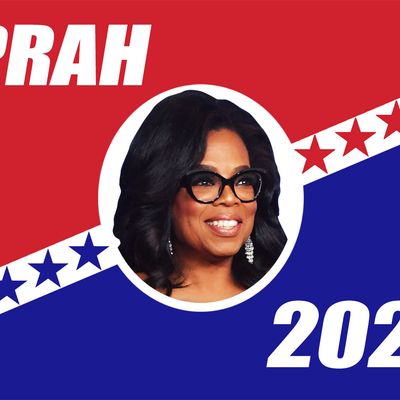
The buzz for a possible 2020 presidential candidacy by veteran talk-show host, entrepreneur, philanthropist, and all-around do-gooder Oprah Winfrey that began with her well-wrought Golden Globes speech occurred at the perfect time for “Why not?” speculation. The 2020 elections are far enough away that anything seems possible. And the ongoing spectacle of President Donald Trump demonstrates that anything is indeed possible in contemporary politics.
An actual Winfrey presidential run would quickly become something quite different from the fantasy projection it represents right now. And so while it’s worth taking the idea seriously, it should not be taken literally as the Oprah America knows and loves suddenly appearing on a presidential ballot opposite Trump. People on political soap operas like the hit show Scandal may suddenly be vaulted to national presidential tickets without the inconvenience of actual campaigns or controversy, but Trump has by no means abolished normal politics. He merely exploited fault lines in the existing political system and won over relatively weak and divided intraparty and interparty opposition with a persona and message that galvanized a distinct following that was central to the GOP base and underestimated as part of the general electorate. It is by no means clear some other celebrity can do the same, despite continuing public hostility to the political Establishment.
Oprah’s assets as a national candidate are real and tangible: 100 percent name ID; enormous personal wealth and even more enormously wealthy connections; a personality with an appeal that reaches well into the ranks of voters who might otherwise be likely to sit out elections; and priceless communications skills honed over 4,561 episodes of The Oprah Winfrey Show and countless additional on-camera appearances.
As a putative 2020 Democratic candidate, Winfrey has several other advantages. One is a field potentially as large and as diffuse as the one Donald Trump divided and conquered in 2016. Another is the unique combination of being a familiar, reassuring figure and a “fresh face” when it comes to electoral politics, particularly if her Democratic rivals wind up including such warhorses as Joe Biden and Bernie Sanders. And a third asset in the nominating contest could well be her identity as an African-American woman. There is a swath of southern primaries relatively early in the process where African-Americans represent half or more of Democratic voters. And in a general-election contest with Trump, women frustrated by Hillary Clinton’s loss to so piggish a man might well rally behind a female nominee with especial vigor, while the 2016 falloff in African-American turnout — a crucial factor in several close states — could be reversed.
But it is by no means certain that Winfrey will draw the sort of inside straight that Trump drew in 2016, making his improbable candidacy viable and then victorious. For one thing, there are at least two prominent African-Americans (Cory Booker and Kamala Harris) and multiple women (Harris, Elizabeth Warren, Kirsten Gillibrand, Amy Klobuchar, and others) mulling serious presidential runs of their own. The field may not nicely line up as Oprah versus the Lilliputians.
Most importantly, the minute Winfrey becomes an active politician rather than a tantalizing possibility, her aura will likely dim, particularly when she is drawn into issue positions that divide the country. She has been known to smile upon public support for private educational opportunities in K-12 education. That’s very controversial within the Democratic Party. She’s vaguely pro-choice, but will have to become outspokenly pro-choice if she wants to be the Democratic presidential nominee. And while her eloquent Golden Globe remarks linking the #MeToo Movement to the civil-rights movement struck a perfect chord for a particular moment in Hollywood, it’s too narrow a platform for a successful presidential candidacy.
The more you think about it, Oprah Winfrey would need exquisite timing to maintain herself as “Oprah” the American icon in the crucible of a presidential campaign. As Ben Smith has noted, simply discussing her as a possible candidate takes a toll on her popularity:
To run for president is to ensure, demand even, that at least 40% of Americans hate you. The one recent political poll on Oprah hints at this: She had a surprisingly high unfavorable rating: 33%. Who dislikes Oprah? When you put her in a political context, Republicans do, it turns out. And Oprah has had her ups and downs, and would be signing on for the sort of hostile examination of her own career that nobody would welcome.
Smith raised another point about a Winfrey candidacy that is worth pondering: Will Democrats embrace an if-you-can’t-beat-’em-join-’em strategy for reclaiming the presidency instead of soberly running someone with a serious record of accomplishment in public office? And will voters be ready for an anti-Trump rather than someone who can trump Trump’s celebrity?
Democrats don’t want to improve on Trump. They want to reverse him. And that’s where governors and senators with deep experience, proven political chops, and an unglamorous sense of normalcy come in.
I dunno about that: If Trump heads towards 2020 with a reasonable chance (say, 30 percent or more) of achieving reelection, Democrats would probably consider anyone this side of Don Jr. as an opponent if it meant beating the feared and despised incumbent, whose trajectory in a second term could be terrifying.
To a considerable extent, the plausibility of Oprah 2020 is a function of the likelihood of Trump 2020. If Democrats ride a huge midterm wave in 2018 and Trump’s approval ratings stagnate in the 30s, it’s unlikely they will resort to their own, benign nonpolitical celebrity. It’s always possible, of course, that with her money and fame and the right landscape Winfrey could conquer the Democratic Party much as Trump conquered the Republicans. But if that’s the idea, she’d better get going right away and descend on Iowa with her heart and her checkbook open.






























